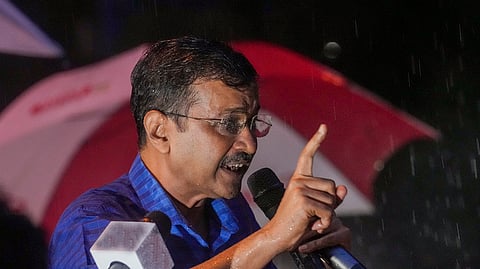

I was part of Aam Aadmi Party (AAP) since its inception till the end of 2015. I was also fortunate enough to get some responsible positions during my stint with the party.
I would like to start by saying that at the time of formation, the Aam Aadmi Party was more of an ideology than a political party. The purity of intent that seemed to drive it was the USP that attracted thousands around the country towards the brand of politics the party seemed to epitomise. The mission to clean up India's murky political field charged up many already energetic converts further.
In fact, the party showcased a unique candidate selection process in front of the people of this country. It was a never-before-seen process. In my opinion, the ideology combined with some unique processes created a sense of hope among the common people.
This was reflected in the party's electoral debut in 2013, when they won 28 seats in Delhi -- a performance few expected.
This was followed by a unprecedented 67 out of 70 seats in 2015. The people of Delhi had reposed their faith in a party that promised to work for them -- in every sense of the word.
The next five years were a game changer.
The changes brought about by the Delhi Government in the field of Education and Health Care made headlines -- not just in India, but even around the world -- and deservingly so. Free water up to 20000 litres per month for residential societies, free electricity up to 200 units per month were schemes which people of Delhi welcomed with both hands.
But such a massive victory would also go on to also bring on its own challenges. Many political opportunists started eyeing the Aam Aadmi Party. That was visible not only in Delhi, but also in other parts of the country.
Unfortunately, in a zeal to expand the party quickly, the top leadership welcomed such opportunists into the fold. Turncoats from other parties were ushered in without much thought. Many with not-so-clean reputations in the society started becoming the face of the party.
The second big challenge was that the party and its leaders became bêtes noires of those at the helm of the affairs at the Centre.
What followed after 2020 and where it all came apart
The election results in 2020 that saw the AAP win again cemented the position of the party and Arvind Kejriwal as the principal opponent of the BJP in Delhi. This resulted in the political slugfest and dirty political games, which we all have been witnesses to.
Unfortunately, AAP and its leaders failed to come out clean in this process. The dilution in the ideology and founding principles were clearly visible. The criteria of candidate selection began to mirror those followed by other conventional parties, whose failures AAP had initially campaigned against.
Though I still feel that the AAP government in Delhi has done a lot of good things for the citizens there, it failed live up to to the expectations of the people when it came to clean politics.
I will not believe any person to be guilty of a crime unless proven guilty in the court of law. But the manner in which AAP leaders were slapped with corruption charges one after the other helped the opposition to create a successful narrative. Unfortunately, I feel, AAP and its leaders failed to counter that narrative effectively.
Going by the results, I would like to state that it looks like the people of Delhi are disappointed at the downfall in the ideology and principles on which Aam Aadmi Party was formed. The party may have to go back to its basics and undo the wrongs before it is too late if it is to rise up again and survive this existential crisis.
(Manoj Padmanabhan is ex- AAP State Convener, Kerala)